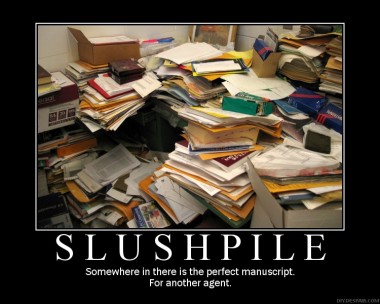All literary agents receive dozens of proposals each week. Most are via email these days, but some still come via the post. Last week was a relatively slow week; my office received only 28 unsolicited proposals via email and two in the post. For the month of June, it was around 170 total unsolicited proposals received. (Unsolicited means proposals that are not from our existing clients. We get a number of these each week too.) The above numbers do not count those received by Tamela, Bob, Dan, Megan, or Lynette. By the way, the picture above is not from my office! I am far less tidy.
I did a quick look at last week’s submissions, which have not yet been reviewed. They include three memoirs, a book explaining the end times, a nonfiction book on righteousness, a book on the nature of sin, and twenty-one novels.
The sheer variety is a bit daunting.
Fortunately, this week didn’t have any head-shaking submissions. But in the past, there have been myriad email submissions that simply ignore our posted guidelines regarding email submissions, such as “Please do not copy and paste your entire manuscript into the body of your email.” Yes, it happens frequently. Certainly, some agencies ask that the material be pasted in the body of the email, but we don’t. (Email fonts on the receiving end are not a writer’s friend.) That is why a writer researches each agency’s guidelines and customizes their approach.
Authors will fail to attach their proposal or sample chapters to an email but instead send a link to some cloud-based service. No one in our offices will click a link from an unvetted source, so those authors’ proposals will be unread.
Despite saying we don’t represent poetry, I once received a PDF attachment with 900 pages of poetry in it. Nine hundred. Recently, I rejected someone’s poetry collection; and they responded with a bewildered email.
One poor soul failed to proofread their email before sending the following sentence: “I would like to send you my quarry letter.”
Head-shaking submissions include writers who find our name in a directory somewhere and pick up the phone and call without doing their research. I once received a call that went something like this:
Agency: This is the Steve Laube Agency …
Caller: What kind of agency are you?
Agency: We are a literary agency.
Caller: What does that mean?
Agency: It means we represent books to publishers on behalf of our clients and manage our clients’ careers.
Caller: Oh good. I do comic strips … and they are really unique… [caller’s voice gets faster and louder as they talk]
Agency: Well, we don’t represent artists or comic-strip artists.
Caller: But I’m a philosopher too! [further explanation followed]
Agency: Well, we [caller interrupts]
Caller: And I’m also a musician with over 500 songs to my credit.
Agency: Unfortunately, we do not represent musicians at this time.
Caller: But I was named rock musician of the year …
Agency: We’re sorry, but it does not appear that our agency would be a good fit for you.
Caller: You want to listen to my stuff for free on Myspace?
Agency: I don’t see how that would be a good use of our time.
Caller: Someday, someone will discover it and make millions.
Agency: We wish you the best in all your endeavors.
Or the time we received a call from an aspiring author who was a psychic with an “amazing” personal story to tell. Oh, and by the way, they also had two novels written and five children’s books ready and waiting.
Don’t get me wrong! I’m not complaining. What I’m trying to say is that the simple act of reading our blog and following an agency’s guidelines can make you look so much better than those who do not take that time. We’ve written about rejection many times, and no agent takes the process lightly. But a little understanding and self-education would make every writer’s experience when approaching an agent a little more tolerable.
(An earlier version of this post ran in June 2014. Not much has changed.)











